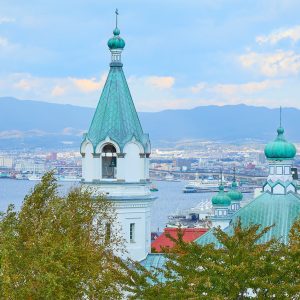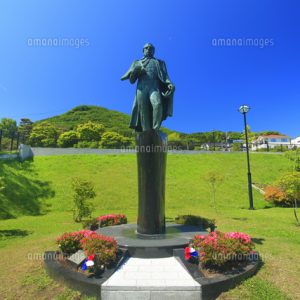January 10, 2022. The Putin administration, which opposes the attempt of a color revolution aimed at overthrowing the pro-Russian government in Kazakhstan, will start a series of talks with the United States from this day. The United States and European NATO member states, which succeeded in expulsion of pro-Russia's Yanukovych administration in 2014, are glaring at the Russian army in eastern Ukraine, which has become the forefront. At the eastern end of Eurasia, the odor of Taiwan's contingency involving Japan is only increasing. What is the tension and anxiety of the people living in the Donetsk region of Ukraine, which is entwined with US‐led NATO and the Okinawa and Nansei Islands, where the Self-Defense Forces are being deployed?
It is the military-industrial complex and the western commercial media, including Japan, that are fueling the crisis and smiling behind the scenes. "Ukraine, Taiwan, Kazakhstan". The media is boiling with special demand. In particular, the newspaper industry, which is suffering from a drastic decrease in the number of copies, will take a break if it continues to report on the possibility of an emergency / hot battle and the scenario of the crisis with all its wisdom on the premise that it will stay on the brink of the Cold War.
This movement in the modern world has been linked to the continuation of the so-called Pax Britannica period from 1815 to 1914, the so-called "imperial century". Britain defeated Russia in the Crimean War (1853-1856), which, along with France, sought to extend its influence to the Balkans. During the Crimean War, Britain went out to contain Russia at the eastern end of Eurasia, Japan.
In September 1854, the British fleet led by Sterling arrived in Nagasaki. The Russian fleet was no longer in Nagasaki, but Sterling warned the Shogunate that Britain and Russia were at war and that Russia had territorial ambitions for Sakhalin and the Kuril Islands. After the conclusion of the Convention of Kanagawa in 1954, the US fleet of Perry stayed in the opened Hakodate for half a month and observed the movement of Russia, which had advanced to Hakodate in search of an ice-free port. Hakodate was the first place in Japan to get involved with the US and Russia.

[Photo] Japan's first Russian Orthodox Church in 1860. It was built as an annex to the Russian Consulate in Hakodate at that time.

[Photo] Admiral Perry's visit memorial, which was erected in Hakodate City in 2002. It was erected by a local organization ahead of 2004, the 150th anniversary of the arrival of Kurofune, on May 17th, the anniversary of Perry's arrival. It is close to the US Consulate, which was established after the opening of the port, and one road away from the former British Consulate.
It can be said that the Meiji government's advance into the Korean Peninsula, northeastern China, and the Russo-Japanese War were carried out on the basis of the geopolitical strategy of containing Eurasia that is, China and Russia in Britain& the United States. Prewar Imperial Japan and Postwar Japan, which became a protectorate of the United States, was controlled by the United States and Britain from the latter half of the 19th century to the present day of the 21st century. Britain's latest slogan ""Global Britain" after leaving the EU can be said to be an attempt by the Anglo-Saxon alliance to block the hegemony that is moving to East Asia with the United States.
After the dismantling of the Soviet Union, under the pro-US Yeltsin administration, huge US and British capital such as finance, oil and natural gas were on the verge of succeeding in taking over the former Soviet state-owned company with the Russian emerging conglomerate Oligarch as a cover. However, it was blocked by the Putin administration, which replaced Yeltsin. Since then, the US and British media have been developing the propaganda of Putin's demonization.
The U.S. and British giants are pulling their hands to dismantle the Putin regime and communist China and smoke unprecedented sweet honey. The power balance situation in the modern world has not changed much from 200 years ago. Not only the relationship with Korea and China, but also the encounter with Russia, which signed a trade treaty with Japan in the middle of the 19th century, was unlucky. This is because the Meiji government made Russia a natural enemy from the beginning. The Russian Revolution and the establishment of the Soviet Union shook the flow. The US-Japan Security Treaty is digging up Japan's rich potential in East Asia.
